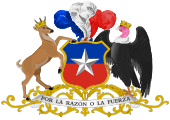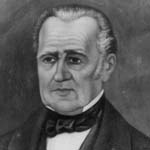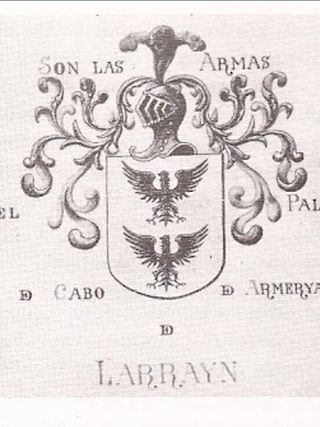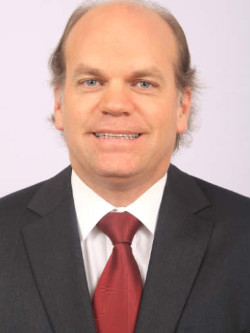 |
|---|
Presidential elections were held in Chile on September 16 and 17, 1829, through a system of electors. [1]
 |
|---|
Presidential elections were held in Chile on September 16 and 17, 1829, through a system of electors. [1]
The newly enacted Constitution of 1828 provided that the President was to be chosen by electors. [2] Two hundred and sixteen electors, three for each congressman, were to be chosen. Each elector voted for two names, without specifying which vote was for President or Vice President.
The election was subject to abuses, so electors gave their vote to Francisco Antonio Pinto and to Joaquín Vicuña.
Even though Pinto was accepted as President, his resignation and replacement by Vice President Joaquín Vicuña triggered the Chilean Civil War of 1829.
| Candidate | Votes | % |
|---|---|---|
| Francisco Antonio Pinto | 118 | 29.06 |
| Francisco Ruiz-Tagle | 98 | 24.14 |
| José Joaquín Prieto | 61 | 15.02 |
| Joaquín Vicuña | 48 | 11.82 |
| José Gregorio Argomedo | 33 | 8.13 |
| Juan de Dios Rivera | 11 | 2.71 |
| José Miguel Infante | 8 | 1.97 |
| Diego José Benavente | 7 | 1.72 |
| José Maria Solar | 6 | 1.48 |
| Other candidates | 16 | 3.94 |
| Total | 406 | 100.00 |
| Source: Chilean Elections Database | ||

Francisco Ramón de Vicuña Larraín was a Chilean political figure. He served twice as acting President of Chile in 1829. Francisco Vicuña was of Basque descent.

José Tomás Ovalle y Bezanilla was a Chilean political figure. He served twice as provisional president of Chile.

Elections in Chile are held nationwide, including the presidency, parliament, regional offices, and municipal positions. Chilean citizens and foreign residents with legal residency of at least five years, who are 18 years or older on election day, are eligible to vote. Previously, voting was voluntary, but since 2023, it has become compulsory.

Joaquín Prieto Vial was a Chilean military and political figure. He was twice President of Chile between 1831 and 1841. Joaquín Prieto was of Spanish and Basque descent.

Francisco Antonio Pinto y Díaz de la Puente was a Chilean politician who served as President of Chile between 1827 and 1829.

Presidential elections were held in Chile on 5 April 1831. Carried out through a system of electors, they resulted in the election of General Joaquín Prieto as president.

The Chilean Civil War of 1829–1830 was a civil war in Chile fought between conservative Pelucones and liberal Pipiolos forces over the constitutional regime in force. This conflict ended with the defeat of the liberal forces and the approval of a new constitution in 1833, that was in force until 1925.

The Conservative Party of Chile was one of the principal Chilean political parties since its foundation in 1836 until 1948, when it broke apart. In 1953 it reformed as the United Conservative Party and in 1966 joined with the Liberal Party to form the National Party. The Conservative Party was a right-wing party, originally created to be the clericalist, pro-Catholic Church group.
The Liberal Party was a Chilean political party created by a faction of pipiolos in 1849. After the conservative victory in the Chilean Civil War of 1829 the liberals became the principal opposition party to the Conservative Party. During the Liberal Party's early history one of its main goal was to create a new constitution to replace the Chilean Constitution of 1833. Rigged election helped to prevent the Liberal Party's presidential candidates to be elected until 1861, during that time elements of the liberal party made attempts to overthrow the government, these were the Revolution of 1851 and the Revolution of 1859. These failed insurrections led many liberals to emigrate, among them Benjamín Vicuña Mackenna. In 1863 a group of liberal split off to form the Radical Party which would hold power from 1938 to 1952. Originally an anticlericalist party that championed classical liberalism, the liberals later became a right-wing party.
Government Junta of Chile was the political structure established to rule Chile following the defeat of the Liberal army at the Battle of Ochagavía. It ruled the country until February 18, 1830, when Francisco Ruiz-Tagle assumed as the new Acting President.

Pedro Félix Vicuña Aguirre was a Chilean journalist and one of the founders in 1827 of the newspaper El Mercurio de Valparaíso, the oldest existing newspaper in Spanish language. He was also a liberal writer and politician.

The 2000 Spanish general election was held on Sunday, 12 March 2000, to elect the 7th Cortes Generales of the Kingdom of Spain. All 350 seats in the Congress of Deputies were up for election, as well as 208 of 259 seats in the Senate.

The 2008 Spanish general election was held on Sunday, 9 March 2008, to elect the 9th Cortes Generales of the Kingdom of Spain. All 350 seats in the Congress of Deputies were up for election, as well as 208 of 264 seats in the Senate.

José Joaquín Vicuña Larraín was a Chilean politician whose selection as Vice President of Chile by Congress precipitated the Chilean Civil War of 1829. He was of Basque descent.

The president of the Chamber of Deputies of Chile is the highest authority of the Chamber of Deputies of Chile. The office was established in 1811 by the First National Congress of Chile.

The Larraín family is an influential Chilean family of Basque origin. Their members include prominent aristocratic politicians and businessmen. The Larrain family first arrived in Chile more than 450 years ago, and they have been part of Chile's history ever since. The Larrain family form part of a group of families commonly referred to as the 'double-RRs', surnames which include two RRs.
The following lists events that happened during 1829 in Chile.

Patricio Walker Prieto is a Chilean politician. He was President of the Senate between 11 March 2015 and 15 March 2016. He was member of the Senate between 2010 and 2018. From 2007 to 2008 Walker was President of the Chamber of Deputies of Chile. He was member of the Chamber of Deputies between 1998 and 2010. Walker is member of the Christian Democratic Party.

The Vice President of Chile, officially known as the Vice President of the Republic, is a temporary post provided by the Constitution of Chile. The "vice president" is a person who fulfills the duties of the President of Chile when cases of incapacity and vacancy occur. However, the consent of the Senate is required for the "vice president" to exercise the duties of the president. This post is held by the Minister of the Interior and Public Security or by the next minister of the government, in the order of succession, in case of the former's absence.

The Constitutional Convention was the constituent body of the Republic of Chile in charge of drafting a new Political Constitution of the Republic after the approval of the national plebiscite held in October 2020. Its creation and regulation were carried out through Law No. 21,200, published on 24 December 2019, which amended the Political Constitution of the Republic to include the process of drafting a new constitution. The body met for the first time on 4 July 2021. Chilean President Sebastian Piñera said, "This Constitutional Convention must, within a period of 9 months, extendable for an additional 3 months, draft and approve a new constitution for Chile, which must be ratified by the citizens through a plebiscite." It ended its functions and declared itself dissolved on 4 July 2022.